QuestionQUESTION: Hi Nathan,
I have a small, 11 gallon (UK), 13 gallon (US) aquarium and I'm afraid i have a couple of questions regarding fish keeping. I'll try and give you as much info as possible. Sorry, about the essay of a question.
First off, is using rainwater a good idea when conducting water changes and if not, what can I use instead (not including a reverse osmosis thingy, as they are expensive and I don't have the space to keep one)?
I have tested the rainwater accordingly and it has 0 Nitrites and 0 Nitrates with a rather low pH of 6.4. To make the water a bit more appealing to the fish I have placed bits of limestone scattered about the tank, so the overall tank pH is 6.8-7.2. However, I have had quite a few sick fish since I have stocked the tank (4 months ago) including:
3 unexplainable and random deaths of platys (believed bullying)
2 cases of pop-eye. 1 case (a dwarf Gourami) was fatal and included a lot of white poop and not eating). The other case of pop-eye (a Black Phantom Tetra) cleared up but the fish in question now has a kind of warty growth which I believe to be an ulcer, however it doesn't seem to be affecting its behaviour at all.
My tank water parameters are:
Temperature: 26 degrees
Nitrate: 50-100mg/l
Nitrite: 0mg/l
General Hardness: 16d
KH (calcium hardness?): 3d
pH: 6.8-7.2
Cl: 0-0.8mg/l
Second question. As you are an expert, would you say that my aquarium is over-stocked? I have been concerned about this for sometime.
I have always judged the fish level on how crowded it looks and whether the fish seem stressed. I don't believe these were issues in my tank (excluding when one Gourami killed the other). Its just that I can't seem to get the Nitrates down below 25mg/l even though I change 1/3 of the water twice a week. I'm going to buy some Nitrate remover to see if this helps with this. Anyway here is the fish list.
1 Dwarf Gourami (owned for 3 months-no problems-except he bullied the other to death)
1 Platy (owned for 4 months-may have killed 2 other platys as he is the biggest)
5 Black Phantom Tetras (no issues apart from with crusty individual)
2 Dwarf Rainbow fish (2 months no issues-great little fish)
2 Cockatoo Cichlids (bought yesterday as a surprise for a birthday present-really worried though as I have read they are really hard to keep =\)
2 Dojo Loaches (7 years-no issues at all apart from one escape attempt)
There are also 8 Amano shrimp in the tank but I have read that they don't contribute to the biomass, I have had no problems with them at all either.
And last but not least - Do I need to lower my GH (general hardness)?
Thanks for your patience,
Rachel
ANSWER: Hi Rachel,
No worries about the "essay of a question" - I like to read, and I often type essays of a response.
For the rainwater question, I would recommend against using rainwater, for two main reasons: Firstly, because of the need to use limestone to raise the pH, and secondly, because there could be trace amounts of undesirable substances in water that falls naturally. pH regulation is a finicky thing, and it would be best if your pH doesn't range from 6.8 to 7.2 from time to time. The limestone in your tank is causing it to fluctuate, which isn't a good thing. Using tap water is not a bad idea, as long as you treat it first. All you need is a water conditioner. A water conditioner (you can find these at your local fish store), removes chlorine and heavy metals, making water safe for fish to live in. You didn't mention using a similar product, so I assume you add the rainwater directly to the tank without treating it. The conditioning takes less than a second, and you'll have safe water for your fish instantly. I use tap water for all my fish.
In response to your various fish queries:
Platys are fish that should be kept in ratios of at least 2 females, preferably 3, to each male. Males will actively pursue and try to mate with females, and a lone female will get bullied and stressed, sometimes to the point of death. To tell the difference, look at the anal fin. If it is pointed, that's a male. If it is fan-shaped, that's a female. Platys breed insanely. Your tank is rather small, so I'd recommend against keeping both males and females, unless you have experienced fishkeeping friends who would like some tiny fish! Keeping only males is the best way to enjoy a colorful display of Platy fish without the breeding.
Stringy white poop is a sign of either a bacterial infection or internal parasites. Judging from the pop-eye, I'd guess it's a bacterial infection. There are many fish-specific medications out there that can treat bacterial infections. I always recommend keeping at least two kinds of medications in your fish cupboard, drawer, or underneath your aquarium. These two kinds would be a general anti-bacterial medication and a general anti-parasite medication. Both are easily found at your local fish store. Always have them on hand, as diseases can progress quickly and you may not have the time to do a trip to the store in time. Since I'm from Canada, I'm not quite sure what brands of products are available where you live, but most brand-name products work well. (API, Mardel, Sera, etc.)
As for your water chemistry:
Your temperature is fine. Make sure it is a constant level (As long as your heater is working properly, this should be of no worry)
Nitrates are rather high. As values approach the 100ppm (mg/L), the fish will begin to feel the effects of it. Nitrates are only toxic in high concentrations, but they will bother your fish. Nitrates are the products of nitrification, specifically the work of natural beneficial bacteria in your aquarium converting toxic Nitrite into Nitrate. To get rid of Nitrate, simply make sure you are keeping up with your regular water change cycle (10-20% of the water in the aquarium, once a week) There is no need to change 1/3 of the water twice a week. Don't buy nitrate removers. They are unnecessary and you don't need extra chemicals in the aquarium. Perhaps try adding some live plants to the tank. Easy to keep plants include the Amazon Sword, Java Fern, Wisteria, and various Anubias species.
The hardness of your water is rather high. A combination of the rainwater and the rocks in your tank are probably making it so high. It's not a major issue, but fish such as Tetras prefer softer water. If you switch to tap water, and remove the limestone and other rocks in the tank, this shouldn't be a problem.
As I mentioned earlier, there should be almost no detectable pH changes in the water. Fish suffer from these changes. Again, this problem should not be an issue if you use the combination of tap water with a water conditioner. Make sure you change the water weekly. Don't change it more than that though.
As for Chlorine, there should be zero. Any amount is detrimental to your aquarium. Chlorine is easily removed by water conditioner. A water conditioner should be an essential part of any aquarium.
Unfortunately, your tank is overstocked. The Cockatoos are not compatible with the other fish, as they can become extremely territorial during breeding time, and especially because a small tank won't allow any places for the fish to be alone from the others. This will certainly cause problems. You need a minimum of 20 (US) gallons for each pair.
Although you may think the Dojo loaches are great for your aquarium, they really aren't very suitable to a 13-gallon aquarium. These fish can reach sizes of 6", and keeping them in a small aquarium is not a great idea, as they will not grow to their full size, and if they do, they won't have very much room to live in! However, since you have already kept them for 7 years, I wouldn't worry too much about it, but for future reference, make sure you get fish that start out small and stay small.
As a general guide, you should keep one inch of fish per one gallon of water. This common "one inch" rule refers to the adult size of the fish, not the current size. For example: Black Phantom Tetra - Average Adult size = 2 inches. This means you can keep about 7 Black Phantoms (if you were only keeping Black Phantoms) in a 13 gallon tank. For a quick note, all gallons I list are in US gallons. The fishkeeping hobby uses inches and US gallons as opposed to centimeters, UK gallons, an liters.
You are right, shrimp do not contribute significantly to the biological load of the aquarium.
As far as stocking issues go, right now, I'd strongly recommend returning the Cichlids to the fish store. Most fish stores will allow returns in exchange for store credit. Use that store credit to get yourself some water conditioner, and fish medications! The rest of the fish in the tank will be alright for now, even though it's still a bit overstocked. The hassle of trying to find someone who is experienced enough in the hobby who will take care of your fish is simply too difficult. As long as you keep up with water changes every week, your fish will be fine.
For your aquarium, I'd recommend changing a quarter (25%) of the water out every week, replacing it with tap water treated with a dechlorinator (water conditioner).
A friendly reminder: Try to research any fish online for their compatibility and size, behavior, and water conditions before you buy. Avoid impulse buying based on the pretty colors or interesting appearance of certain fish. More times than not, these fish will not be compatible with other fish.
So, in quick summary:
-Use tap water, but buy a water conditioner to treat the water
-Remove rocks from the aquarium
-Buy and always keep on hand an anti-bacterial and anti-fungal medication (for fish)
-Return the Cichlids, as they are not compatible
-Change 25% of the water weekly, replacing it with fresh water
-Your water chemistry is fine, except for the Nitrates and pH changes
-The above problems will be solved automatically once you start doing regular water changes and stop using the rainwater/limestone combination
-Don't get any more fish
If you have any other questions, feel free to ask a follow-up question - I'm always happy to help!
Good luck, and Happy Fishkeeping!
Nathan
---------- FOLLOW-UP ----------
QUESTION: Thank You very much for your help. I will sort out all the issues as soon as I possibly can =] (probably wednesday) All your advice made sense and was very helpful.
Unfortunately, the local fish store I bought the Cichlids from will not allow returns (they tell you when you buy them) because they can't re-sell them, apparently =/
(most fish stores in England don't allow returns on fish unfortunately)
I was thinking of using the Aquarists Online website? However, I don't know how to pack fish. Any ideas about this?
I have got some API water conditioner but I have always been sceptical of it. I guess I'll start using it now though =D
Thank you for your help.
Rachel
AnswerHi Rachel,
Packing fish for shipping, especially for long distances, is a tedious business, and in many cases, the fish end up either extremely stressed or dead. This is because they are kept in very small volumes of water, with little control over their temperature. They often become stressed, weakening their immune systems, and many fish do not fare well.
Commercial fish breeders pack their fish in bags or tubs placed in a styrofoam container, along with a heating pad to keep tropical fish at the correct temperature. I've never actually done this myself, but personally, I wouldn't attempt it.
Your best bet would be to either get another tank to hold the cichlids in (they would look absolutely stunning in a nicely decorated tank all to themselves), or give them away/sell them to a local hobbyist. If you're going to be using a website to sell them, try and find a buyer within a reasonable drive away. That way, you can deliver the fish yourselves and eliminate the risk of the fish dying in transport, AND eliminating the post-office hassle when you inform the clerk your package has live fish in it! Or, you could get a friend interested in the hobby by offering the fish to them - a great activity for a weekend day could be helping a friend purchase and set up a beautiful aquarium!
See if you can find a fish store that will allow returns. Most stores will not give refunds, but some will give store credit, or perhaps a fish swap or exchange. Look around, I'm sure there's a store or two that is courteous enough to do so. Large chain stores often give store credit, and locally-owned small fish stores might allow for a fish swap.
I'm glad you decided to use the water conditioner. API is a good quality brand, and will serve you well! Your fish will silently thank you for the dechlorinated and fresh water!
Good Luck ,and Happy Fishkeeping!
Nathan

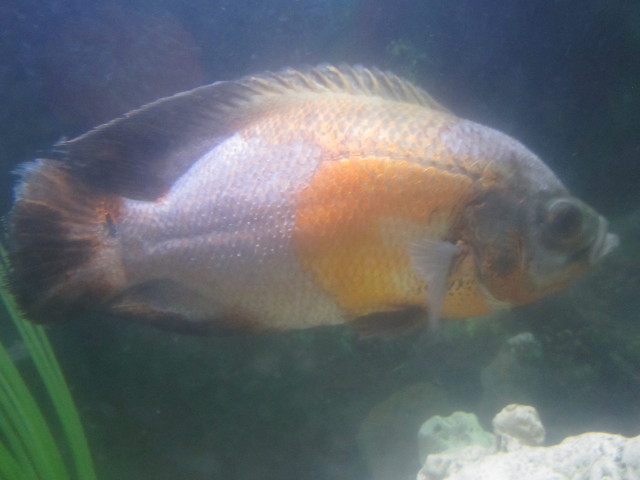 really sick tiger oscar
Question
tiger oscar
I have a tiger Oscar that seems to
really sick tiger oscar
Question
tiger oscar
I have a tiger Oscar that seems to
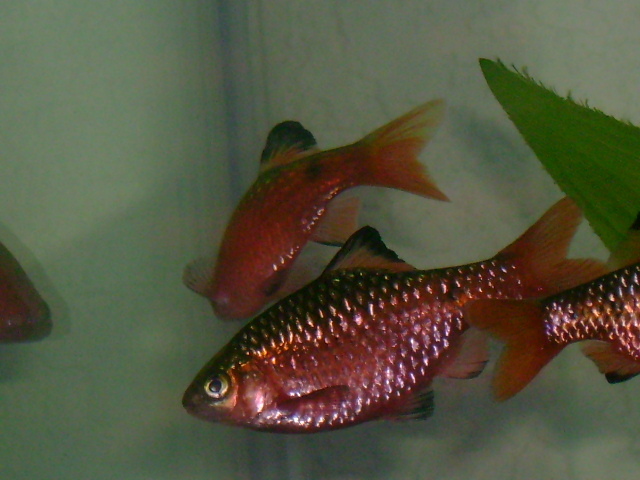 unknown fish
Question
Unknown Fish
I got 3 fish from a friend, but d
unknown fish
Question
Unknown Fish
I got 3 fish from a friend, but d
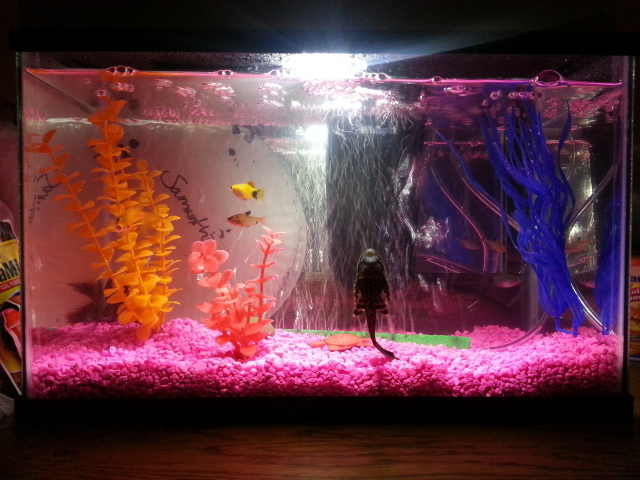 help! I have a new 5 gal tank & too many fish, I think
Question
aquarium
My daughter won 2 goldfish at
help! I have a new 5 gal tank & too many fish, I think
Question
aquarium
My daughter won 2 goldfish at
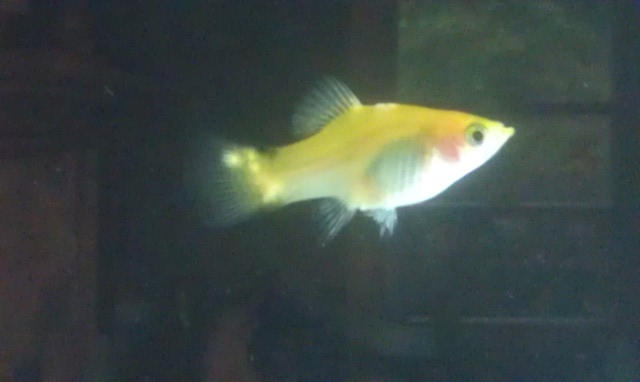 Yellow Platy with Spots
Question
Yellow Platy with spot
Large white spot
Yellow Platy with Spots
Question
Yellow Platy with spot
Large white spot
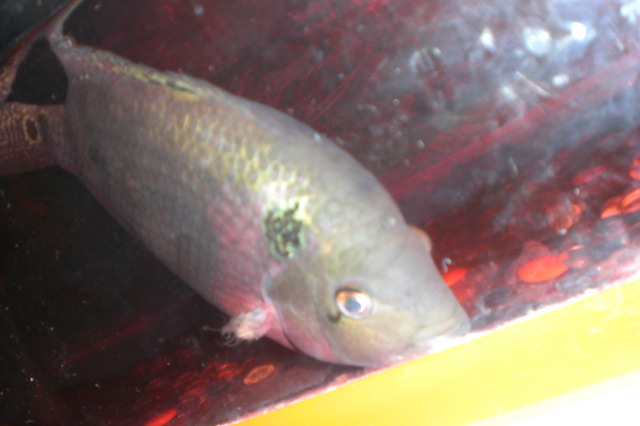 hi (about my flower horn fish)
Question
this is my flowerhorn
hi how are u? im just h
hi (about my flower horn fish)
Question
this is my flowerhorn
hi how are u? im just h